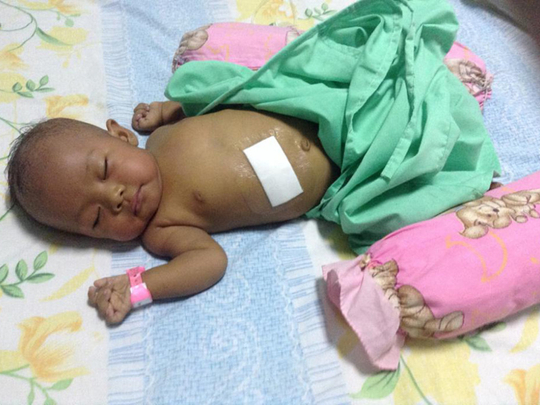
Abu Dhabi: The arrival of a baby girl in Grace Carungay’s life was an occasion of great joy. But this elation was short-lived for the new mother who soon noticed that her daughter looked unhealthy.
“She had a yellowish tinge to her features, and initially we believed that exposing her to the sun would help. So I was devastated when her paediatrician told me that baby Aleeyah had biliary atresia, which would require surgeries to be corrected,” Carungay, a 31-year-old Filipina expat, told Gulf News.
Aleeyah, who was born in March 2013, is now nine months old, and urgently requires a liver transplant. The procedure, which is estimated to cost 4.5 million pesos (Dh1.1 million) in the Philippines, is something Carungay cannot afford on her own.
“I worry about my daughter day and night, and right now, her life depends on the generosity of [other] people,” Carungay said.
Biliary atresia is a life-threatening liver disease, in which vessels known as bile ducts are damaged. Bile ducts are responsible for carrying a fluid called bile that is produced by the gall bladder, to the liver for storage, and from the liver to the small intestine for digesting food. Bile helps in the digestion of fats. The ducts also allow for toxins and waste products to be carried out of the body.
The only effective treatments for the disease involve a surgical procedure to drain bile into the liver, or a liver transplant. In Aleeyah’s case, doctors found that her liver was too damaged because the bile was not being drained. As a result, the surgery would not be successful, and the only course of action left was to pursue a liver transplant.
Aleeyah is currently being cared for by Carungay’s mother and sisters in the Philippines.
“The Philippines’ government will cover a portion of the cost, and the total amount has also been discounted by the hospital. I also have some funds at my disposal. But at this point, I still need Dh178,000 to save my baby’s life,” Carungay said.
The young mother works as a receptionist at a facilities management firm in the capital and takes home just about Dh2,500 each month. Her concern was exacerbated when Aleeyah was hospitalised twice last November after she began vomiting blood. “The doctors tell me that the lifesaving surgery needs to happen as soon as possible, but I still do not have the funds,” Carungay said.
Recently, she began to sell Dh30 T-shirts, and has also opened up an online fund-raising page.
“I appeal to all residents to help me save my darling child. Her condition is deteriorating, and the later the surgery the occurs, the less successful it will be and the more chances she will have of developmental disorders even if she survives,” Carungay pleaded.












